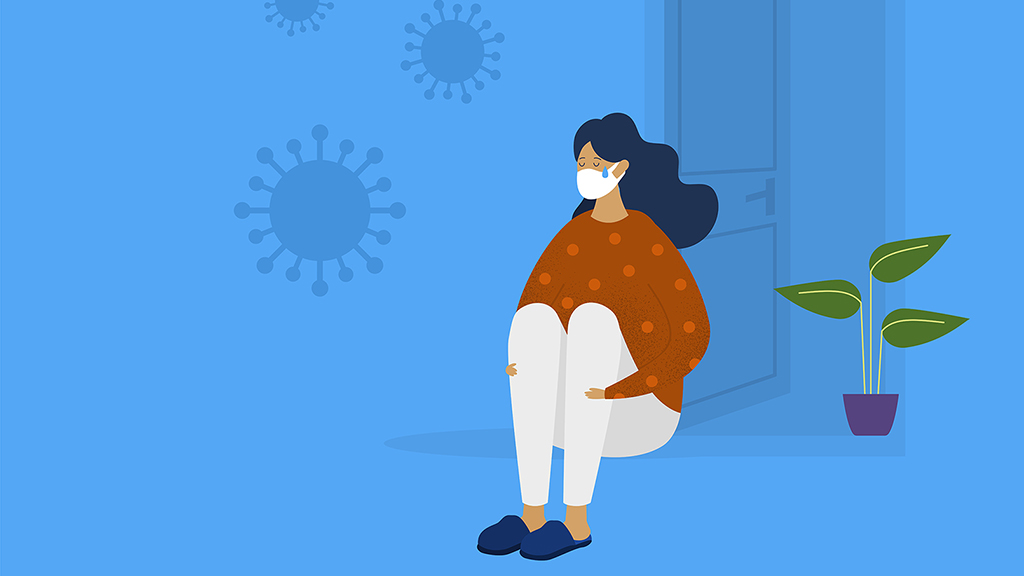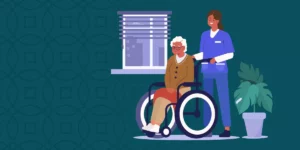
When the pandemic broke out, the virus seemed to be the most significant danger. But things turned out to be different. Together with the consequences of the disease, social isolation itself impacted people’s health, mood, and relationships. How do people adapt to the new reality? The statistic is disappointing here: the percentage of adults reporting the symptoms of anxiety and depression has grown from 11% in the first half of 2019 to 42% in December 2020 in the US. Evidently, this is a cumulative effect of isolation.
This year’s research reports get the tendency’s strengthening: a recent federal telephone survey of 11,000 Medicare enrollees shows that:
- 40% reported feeling less socially connected to family and friends than last year’s November,
- 28% feel more stressed or anxious,
- 22% admit to feeling more sad or lonely.
According to NBCI, older adults are a high-risk group for isolation consequences. The new wave of the COVID-19 virus hits the world, and we must learn how to help ourselves and our loved ones survive the lockdowns. We’ve collected some ways and solutions for you in our new article.
Prevention and Help: Caring for a Loved One with COVID-19
The rapid spread of the disease creates panic and a feeling that it is impossible to escape. Nevertheless, simple and well-known safety precautions are still relevant. Stick to these rules and remind those you care about to:
- Avoid crowded places. Although concerts and other public events are coming back into our lives, their safety is deceptive.
- Get vaccinated. According to the data by Yalemedicine, the vaccines show 72 and more percent of efficiency in preventing COVID-19 and 86 and more percent in preventing severe cases of the disease.
- Wash your hands often with soap. There is little new in this helpful habit, but it has never before been so helpful.
- Use contactless payment methods and wear disposable gloves while visiting shops or pharmacies.
- Clean and disinfect things you frequently use, including your cell phone. Otherwise, it doesn’t matter how often you wash your hands with soap.
- Always carry a hand sanitizer in your bag. Use it after visiting public places or being in transport.
If you or your loved ones were unable to avoid infection, do not panic. Here are five simple steps to organize treatment and comfortable isolation conditions:
- Tell the general practitioner about your suspicion and have an examination to find out more about the disease. You can get a consultation and a referral for tests remotely, thanks to the possibilities of telemedicine.
- Inform your contacts about the confirmation of the disease. Don’t be shy, and don’t hide your condition because lives depend on timely information.
- Organize the living conditions of isolation. Help your relatives buy food and medicines–or get their help with these chores if it’s you going into isolation–and make sure it’s delivered in a non-contact way. After returning home, wash your hands with soap, and disinfect your outer clothing.
- Take care of the intellectual needs of the sick person. Perhaps a subscription to a TV channel or an e-book will please him even more than a good meal.
- Communicate with loved ones who are forced into isolation. Video contact is a good solution as it makes them feel closer to you. And you will be able to see how the recovery process is going, whether they have trouble breathing, etc.
Seven Types of Mobile Apps to Use in Monitoring and Support of Isolated People
Of course, technology tries to keep up with the worldwide challenge. Here are the main categories of pandemic apps that can help care for someone with COVID-19 and anyone who is self-quarantining.
Pandemic App #1: Telemedicine app. Clinics have included remote consultations in their list of services, and increasingly, hospitals and insurance companies offer their own apps. A patient gets in touch with a doctor, gets a prescription, or a medical check-up referral. Many of the telemedicine apps have a video link option, which makes consultations more effective. The processing of sick notes and the management of appointments with specialized doctors is also done online, so the telemedicine app is your doctor right on your smartphone.
Pandemic App #2: Location tracking app. In many countries, such apps help keep travelers safe and isolated and track the movement and contacts of infected people. There’s been a lot of discussion around their use connected with privacy, legality, etc. But it may be a necessary measure for the lives and safety of many people around. In addition, movement data is only provided to the regulatory authorities, which are obliged to keep this information secret. Usually, these apps ask for a photo every few hours and update your status every 24 hours.
Pandemic App #3: Water Drink Reminder. Equally relevant to those who are sick and those who are caring for someone with COVID-19. Remind your loved ones to stay hydrated, and encourage them to install a water drink reminder that will add some gamification to the process. Staying hydrated and washing your hands with soap is standard advice, but they are of great importance during the pandemic.
Pandemic App #4: Entertainment app. Music, movies, magazine subscriptions, and more — anything that will cheer up your loved ones will do. Applications with intellectual games can be helpful. After all, many patients report confusion during the disease. And a game will help to activate the resource of the mind in a fun way.
Pandemic App #5: App for mental health. In order to assess person’s mental state and help them, a timely diagnosis is needed. And apps for guided meditation and other self-help methods will come in handy for people living alone. Learn more about the types of mental health monitoring and improvement apps and choose the right one for you in our previous article here.
Pandemic App #6: Communication app. Phone calls are often not enough. Video conference calling with family members will help your isolated loved one feel connected. Text messages with personalized stickers and emojis can make them smile, too. So, communication solutions are an essential king of apps for living alone.
Pandemic App #7: Personal safety app. Even living alone temporarily carries risks. You can learn more about the dangers of living alone and ways to keep loved ones safe here. Personal safety and emergency alert apps are still among the top choices for this purpose.





